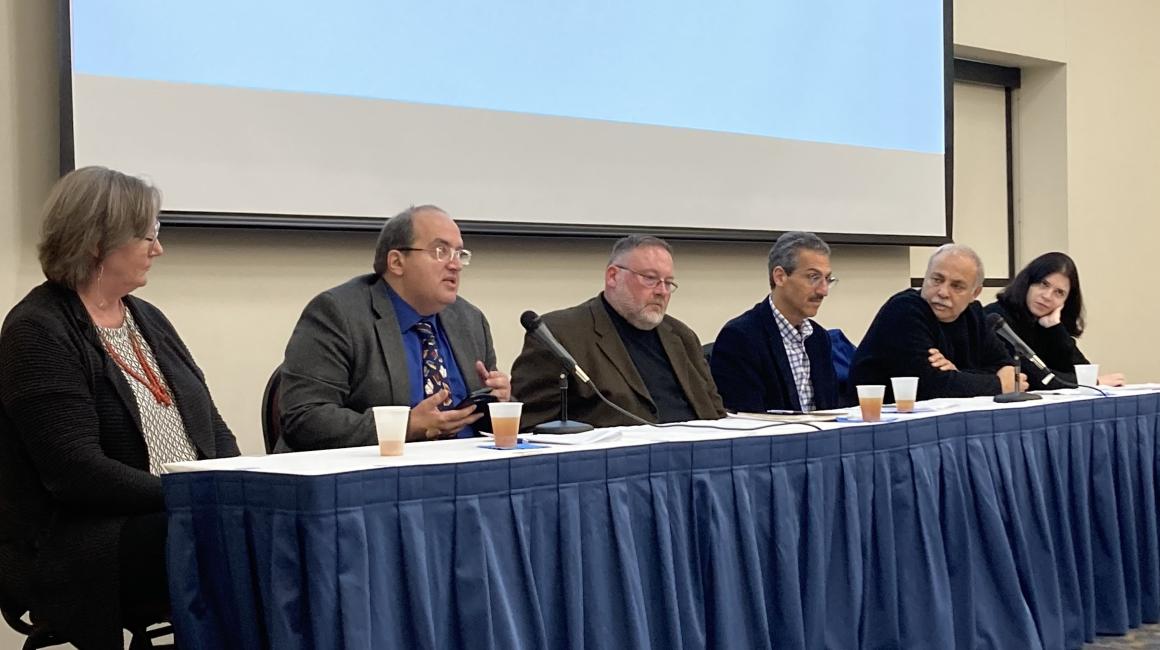
What would a two-state solution look like?
What can we, as University of Michigan-Dearborn students, do to counter false narratives?
What happens next?
These questions and more were addressed at a Community Forum on the Middle East Crisis, organized by the Office of the Provost and held Thursday evening in Kochoff Hall in the Renick University Center.
“We are grieving the loss of innocent lives and families torn apart in Israel and Palestine," Associate Provost Maureen Linker stated in the event’s opening remarks. Linker stressed that the purpose of the event was to help the campus community better understand the situation in Gaza and Israel, noting that understanding does not mean to accept or to forgive, but to work toward solving.
Linker then introduced a panel of faculty members with expertise on the region and its diasporic communities in metro Detroit: Associate Professor of Anthropology Rose Wellman, Associate Professor of History Hani Bawardi, Professor of Middle East & Iranian Diaspora Studies Cam Amin, Lecturer in History and Director of the Voice/Vision Holocaust Survivor Oral History Archive Jamie Wraight, Professor of History & Arab American Studies Sally Howell (who spoke on behalf of herself and Assistant Professor of Criminology and Criminal Justice Amny Shuraydi) and Assistant Professor of Arabic Studies and Director of the Center for Arab American Studies Wessam Elmeligi.
Panelists discussed several historical and contemporary issues that shed light on the current violence. Bawardi offered a history of deadly attacks against Gaza and Amin provided a brief overview of Jewish settlement in the Palestinian Territories, while Wraight placed the formation of Israel in the context of Jewish people from Eastern Europe and elsewhere fleeing the Holocaust. Panelists also discussed Islamophobia, the experiences of metro Detroit’s Arab community, and the recent cancellations and condemnations of Palestinian authors and others who have criticized the attacks on Gaza.
Panelists drew on personal, as well as scholarly, experience. Bawardi recalled a visit in 1994, when he moved freely between the Palestinian West Bank and West Jerusalem, which is a part of Israel, enjoying simple pleasures like coffee with friends and a “taste of peace.” “It was possible,” he said. “I could see it. I could experience it for a time.” Bawardi believes the current violence has shattered that possibility. “The hope is vanishing, unfortunately, because of the impending tide of religious extremism in Israel,” he said.
That does not mean students – many of whom have family ties to the region and are witnessing violence of this magnitude there for the first time in their lives – should not take action. “Learn more about what is going on. Learn more about your own rights. Don’t let anyone write your narrative. Write your own narrative,” said Elmeligi. “You are way more powerful than you think.”
“The way to fight back is to form solidarity with other people of color who have different narratives of exclusion,” Howell added.
In a question submitted in advance of the event, an audience member asked whether Jewish students on campus were safe to express their grief over the loss of Israeli lives. Several panelists emphasized the supportive community at UM-Dearborn and stressed that all students’ perspectives and concerns must be listened to and respected.
AliReda Jeafar, a graduate student in public administration and policy, came to the forum to learn from faculty with deep expertise in the issues underlying the current conflict. “It was definitely everything I expected. It was as nuanced as I had hoped, and it definitely spoke to both sides. And it really aimed to preface this issue more as a political problem, more than this religious issue that everyone is just hell-bent on painting it as,” he said. “I found it very intellectually refreshing.”
Linker reminded the audience that the conversation is ongoing. There are boxes and index cards placed all around campus and the UM-Dearborn community is invited to share their thoughts and feelings on the war and the ways it is impacting them. For those who want to paint, draw or write on a larger canvas, they can stop by the Center for Arab American Studies, where art supplies are available. The reflections will be curated into an exhibit, “UM-Dearborn Expressions on the Crisis in the Middle East.”
Article by Kristin Palm



